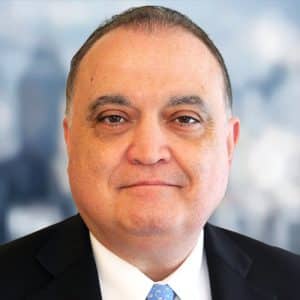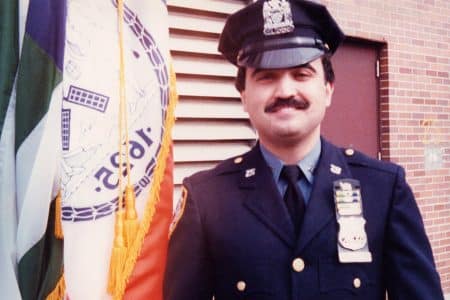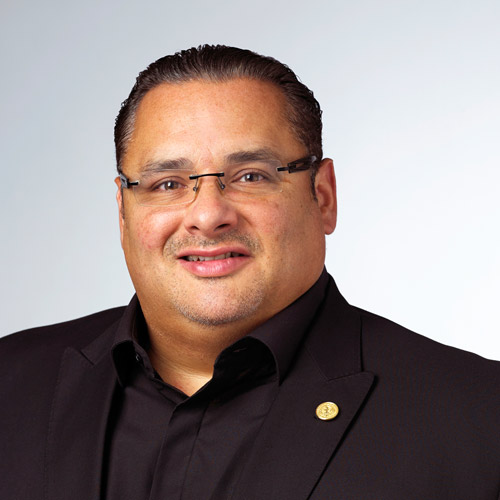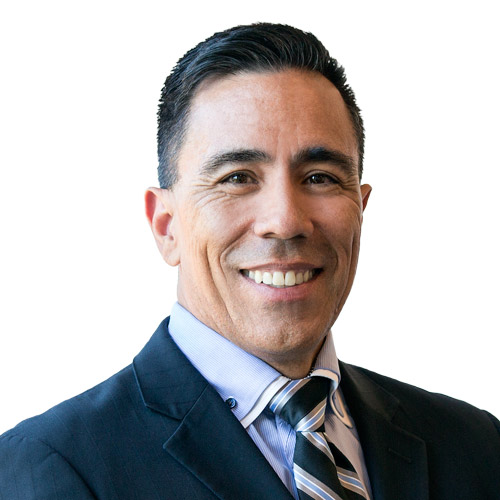
Jorge Pedreira doesn’t have a poetic answer for why he went from being a cop to a lawyer and then to a banker. It wasn’t part of some grand scheme or that he woke up one day deciding to go in another direction. Instead, Pedreira’s path was determined by opportunities that presented themselves, and his passion and drive to take on new challenges.
Today, Pedreira is the chief operating officer of investment banking for the Americas at Nomura. “I’m not afraid of changing courses,” he says. “No matter the challenge, I can get things done. As a former attorney, I’m able to analyze transactions. As a former cop, I’m not afraid of taking risks.”
Breaking the Mold
Pedreira was born in New York City. His mother, who was born in Spain, and his father, who grew up in Cuba, decided to settle in the United States for better life and work opportunities. When Pedreira was seven years old, his father lost his eyesight and the family decided to move back to Spain. Pedreira came of age in Spain, finished high school at age sixteen, and decided to attend engineering school. But he hated it.
After going to civil engineering school in Madrid, Pedreira decided to return to the New York. “I was at an age to decide where I was going to be a resident and where I was going to be a citizen,” Pedreira says.
All he knew was that he didn’t want to be an engineer. After spending a couple years working odd jobs, he decided to take the police test. He thought being an officer would be exciting and rewarding—and it was. Pedreira moved up the ranks in the New York City Police Department quickly. He was a uniformed officer at the NYPD 75th precinct, an undercover officer in the narcotics division, and a detective in the vice squad.
Eventually, Pedreira entertained the idea of law school. The police department at the time issued two scholarships—one for New York Law School and one for St. John’s University School of Law—and Pedreira was vying for one of them. One day he got a call from the police commissioner’s office congratulating him on a full scholarship to St. John’s. Pedreira thought it was a joke and hung up. The commissioner called him back saying it wasn’t a joke and that the dean of St. John’s would call. “Please don’t hang up on him, too. This is a real scholarship.”
Pedreira didn’t go to law school so that he could leave the police department; he simply wanted to take advantage of an opportunity to move up the ranks and have a backup plan if he ever retired from the department. He graduated at the top of his class and was the first evening student with a full-time job to become the managing editor of the law review at St. John’s.

While in law school, Pedreira worked at the NYPD’s legal bureau. However, he became most interested in the business side of the law. He took a leave of absence from the NYPD to do an internship at Wall Street corporate securities firm Willkie Farr & Gallagher. Pedreira eventually left the NYPD to work full-time at the firm.
“Leaving the NYPD was a tough decision,” Pedreira says. “I loved being a cop—I have a lot of good memories, had a lot of laughs, and spent time with great people. I left the NYPD for an opportunity to work at one of the top law firms in the country. If I had waited, it may not have been there.”
For Pedreira, opportunities only continued to roll in. He left Willkie Farr & Gallagher in 1997 to work for a boutique investment bank, Cowen and Company, which was eventually purchased by the French bank Societe Generale. “There I was—suddenly the head of legal for an investment bank,” Pedreira says.
As a single father raising a daughter, responsibilities at Societe Generale Cowen were too demanding, so he transferred to UBS Investment Bank, where he became special counsel for Latin America. Then, the financial crisis hit in 2008 and 2009.
That’s when someone who worked with Pedreira at Cowen gave him a call. He remembers the former coworker telling him that Nomura was going to expand in the United States, the United Kingdom, and China, and they needed a person who had investment banking experience. After a long lunch with the then general counsel, Pedreira was hired on the spot. He ended up becoming the be the head of legal for the investment bank, and eventually the chief operating officer.
His current strategies for the investment bank have the end of sustaining profitability and revenue in tough working conditions. “You can’t have just one plan,” Pedreira says. “You have to have many plans. You have to be able to adapt as conditions change.” He is also focused on creating an attractive work environment and strong company culture.
It’s an exciting time for the financial services group in the Americas, Pedreira says. The company has been at the forefront of several cross-border transactions, and Pedreira sees Nomura expanding in both the United States and Latin America. He hopes brand recognition continues to rise for the Japanese company, which opened its first US office in 1927.
Proving It to Himself
Pedreira’s success didn’t come without its fair share of challenges. He has always had a thick accent, and he remembers one interview at an international law firm with one of its partners. She looked at his résumé and wasn’t very impressed with Pedreira’s detective work. Then she saw that he was top of his law school class and managing editor of the law review, and she asked him whether he got to be managing editor because of his minority status. Understandably offended, he ended the interview early and walked out.
“I was raised in a different country,” Pedreira says. “I struggled with a language barrier when I came back to the US at the age of twenty-two. My parents couldn’t pay for my school. Therefore, I constantly had to prove myself, and I did. I was the best cop I could be. I was the best lawyer I could be, and now I’m the best COO banker that I can be. It’s always about proving myself, and sometimes the road isn’t easy.”
“I was the best cop I could be. I was best lawyer I could be, and now I’m the best COO banker that I can be. It’s always about proving myself, and sometimes the road isn’t easy.”
Jorge Pedreira
Pedreira says none of his achievements would have been possible if he went the traditional route. From all his experiences, he urges others not to shy away from challenges. “Keep moving ahead,” he says. “I don’t know that I would do anything differently. My path may sound odd, but it’s been very rewarding, and I’m happy with the way my life has been.”
Nomura by the Numbers
28K+
employees in over 30 countries
70+
different nationalities represented in workforce
90%
of global economic and financial indicators are covered by Nomura’s global research teams
720K
elementary school, high school, and college students have attended Nomura lectures on finance and economic development

